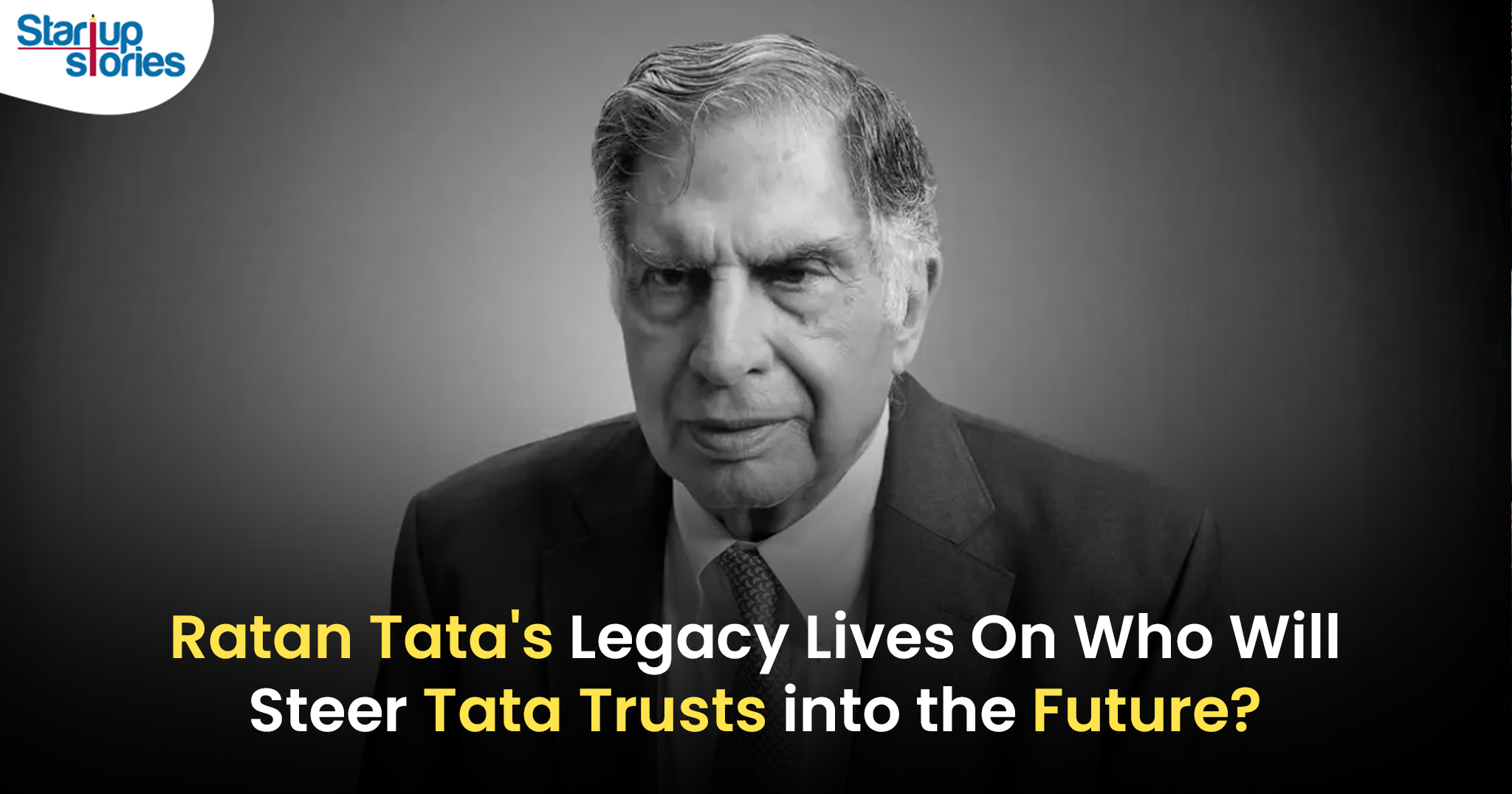Entrepreneur Stories
Ratan Tata Leaves a Legacy: Who Will Lead Tata Trusts Forward?

The passing of Ratan Tata has created a significant leadership vacuum at Tata Trusts, the philanthropic organizations integral to the $165-billion Tata Group. Particularly influential among these are the Sir Dorabji Tata Trust and the Sir Ratan Tata Trust, which collectively own nearly 52% of Tata Sons, the parent company of the conglomerate.
Leadership Transition
Ratan Tata did not appoint a successor prior to his death, placing the responsibility of selecting a new chairman squarely on the board of trustees. The trustees are expected to name an interim leader until a permanent appointment is made. Historically, leadership roles within Tata Trusts have been closely associated with the Tata family and the Parsi community.
Governance Changes
Ratan Tata’s era was notable for being the last time one individual held both the chairmanship of Tata Sons and Tata Trusts. In a significant governance shift, the company’s Articles of Association were amended in 2022 to separate these roles, raising questions about the future direction of the Trusts following Tata’s demise.
Candidates for Leadership
The board of trustees now faces the critical task of choosing a new chairman, which is vital for maintaining stability within India’s largest business conglomerate. Key figures in contention include:
- Venu Srinivasan: An industrialist from TVS, currently serving as vice-chairman of the Trusts.
- Vijay Singh: A former defense secretary, also serving as vice-chairman.
However, their prospects for ascending to the chairman position seem limited.
Noel Tata: A Strong Contender
Another leading candidate is Noel Tata, Ratan Tata’s half-brother and chairman of Trent. At 67, Noel’s potential appointment would align with the traditional preference within the Parsi community for a family member to take the helm of the Trusts. With over 40 years of experience in the Tata Group, his candidacy carries significant weight.
Noel joined the Sir Ratan Tata Trust as a trustee in 2019 and subsequently became a board member of the Sir Dorabji Tata Trust in 2022. His inclusion in these roles has been interpreted by many as a move to ensure continuity in leadership. If appointed, Noel would become the 11th chairman of the Sir Dorabji Tata Trust and the sixth chairman of the Sir Ratan Tata Trust, continuing a legacy often led by Parsis.
Other Influential Figures
While Noel Tata stands as a strong contender, other influential figures include:
- Mehli Mistry: A close confidant of Ratan Tata.
- Darius Khambata: A senior lawyer who advised Tata on succession issues.
The decision-making process will likely consider Tata’s personal wishes, which, while not legally binding, may provide guidance to the trustees in shaping the future of the Trusts.
Importance of Leadership Selection
Choosing a new chairman is critical for influencing the future trajectory of Tata Trusts and their relationship with Tata Sons. The selected individual will need to strike a delicate balance between the philanthropic objectives of the Trusts and the commercial interests of the Tata Group, ensuring that Ratan Tata’s legacy continues to thrive.
The Broader Context
Ratan Tata’s passing comes at a time when his leadership has left an indelible mark on both business and philanthropy in India. Under his guidance, Tata Trusts have been involved in numerous charitable initiatives, including healthcare, education, and rural development projects that have significantly impacted millions across India.
As discussions about succession unfold, stakeholders will be closely watching how this transition shapes both the philanthropic landscape and corporate governance within one of India’s most revered business groups. The decisions made in this period will not only influence internal dynamics but also affect how effectively Tata Trusts can continue their mission in line with Ratan Tata’s vision for social responsibility and community engagement.
Videos
T.N. Seshan: The Fearless Reformer Who Redefined Indian Democracy

T.N. Seshan’s name stands tall in India’s history as the man who transformed the nation’s electoral system with extraordinary courage and integrity. Born in 1932 in Kerala, Seshan grew up with values of discipline, education, and service to the nation — virtues that shaped his illustrious journey. From his early brilliance at Madras Christian College to his advanced studies in public administration at Harvard University, Seshan’s path reflected rare determination and intellect. Joining the Indian Administrative Service in 1955, he built a reputation as a no‑nonsense officer committed to efficiency and honesty, serving in key roles such as Secretary of Defense and overseeing vital national programs.
As the Chief Election Commissioner of India in 1990, T.N. Seshan sparked a new era of electoral integrity. In a system once marred by corruption, violence, and malpractice, Seshan brought order, fear, and respect through his groundbreaking reforms. He introduced voter ID cards, imposed strict spending limits on campaigns, and insisted on transparency at every level of the election process. Despite criticism from political circles that labeled him dictatorial, his relentless pursuit of fairness empowered every citizen to vote fearlessly. Under his leadership, the Election Commission became a symbol of strength and integrity in Indian democracy.
Seshan’s passing in November 2019 marked the end of an era, but his message continues to resonate across generations. Leaders from every corner of the country mourned the loss of the man who restored faith in free and fair elections. His enduring legacy reminds us that true leadership lies not in wielding power, but in serving people with honesty, courage, and conviction. T.N. Seshan’s life remains a timeless inspiration a reminder that democracy thrives only when its citizens are vigilant, responsible, and fearless.
Entrepreneur Stories
Indian Man Quits JPMorgan, Takes 70% Pay Cut to Launch $6 Million Startup

Leaving behind a high-paying job at JPMorgan, an Indian entrepreneur embraced a 70% salary cut to pursue true purpose and passion in the startup world. Disenchanted with what he described as a “robotic” corporate routine, he sought meaningful work that made a real impact. This pivotal decision marked the beginning of his new journey, one focused on value creation rather than titles and corporate perks.
Powered by resilience and fresh perspective, the entrepreneur launched his own startup, prioritizing innovation and hands-on solutions. The road was challenging, but his vision resonated with the market: the startup quickly gained traction and raised $6 million—an impressive acknowledgement of its potential in a competitive landscape. Every hard lesson from early setbacks and bootstrapping paid off in real customer growth and investor confidence.
Today, his journey stands as an inspiring example for professionals seeking authentic success outside the corporate grind. By trading comfort for creative freedom, he grew a venture that solves important problems, generates jobs, and builds wealth beyond just salary. For ambitious founders, his story highlights the power of risk-taking, adaptability, and relentless focus on impact in India’s thriving startup ecosystem.
Videos
Larry Page: The Visionary Co-Founder Behind Google’s Global Success

Larry Page is a visionary technology entrepreneur and co-founder of Google, one of the world’s most influential companies. Born in 1973 in Michigan, Page grew up surrounded by computer technology, which inspired his passion for innovation from an early age. He studied computer engineering at the University of Michigan and later pursued his PhD at Stanford University, where he developed the revolutionary PageRank algorithm with Sergey Brin. This technology fundamentally changed the way search engines rank websites, making Google the most accurate and popular search engine globally.
The journey of Larry Page and Google began in 1998 when they officially launched the search engine from a small garage. Leveraging their unique algorithm, Google quickly surpassed competitors due to its ability to deliver highly relevant search results, transforming internet search forever. Under Larry Page’s leadership as CEO, Google expanded beyond search to launch groundbreaking products including YouTube, Gmail, and Google Maps, turning it into a global tech powerhouse that shapes how we access and interact with information online.
Larry Page later became the CEO of Google’s parent company, Alphabet Inc., driving innovation and investment in next-generation technologies such as artificial intelligence, autonomous vehicles, and healthcare solutions. His visionary leadership and commitment to technological advancement have cemented his legacy as one of the most influential figures in the tech industry. Today, Larry Page remains a key influencer in shaping the future of technology and digital innovation worldwide.














Binance推荐
April 14, 2025 at 6:24 am
Thank you for your sharing. I am worried that I lack creative ideas. It is your article that makes me full of hope. Thank you. But, I have a question, can you help me?
Binance
June 14, 2025 at 3:08 pm
Can you be more specific about the content of your article? After reading it, I still have some doubts. Hope you can help me.
бнанс бонус за рефералв
June 15, 2025 at 11:53 pm
Your point of view caught my eye and was very interesting. Thanks. I have a question for you.
Δωρεν λογαριασμ Binance
July 4, 2025 at 10:08 pm
Can you be more specific about the content of your article? After reading it, I still have some doubts. Hope you can help me.
J88
November 7, 2025 at 8:10 pm
Đến với J88, bạn sẽ được trải nghiệm dịch vụ cá cược chuyên nghiệp cùng hàng ngàn sự kiện khuyến mãi độc quyền.
iwin
November 9, 2025 at 5:04 am
iwin – nền tảng game bài đổi thưởng uy tín, nơi bạn có thể thử vận may và tận hưởng nhiều tựa game hấp
ios超级签
November 10, 2025 at 9:31 pm
苹果签名,苹果超级签平台,ios超级签平台ios超级签苹果企业签,苹果超级签,稳定超级签名
GO88
November 12, 2025 at 5:41 am
Tham gia cộng đồng game thủ tại Go88 để trải nghiệm các trò chơi bài, poker phổ biến nhất hiện nay.
MM88
November 21, 2025 at 11:24 pm
Với giao diện mượt mà và ưu đãi hấp dẫn, MM88 là lựa chọn lý tưởng cho các tín đồ giải trí trực tuyến.
MM88
December 3, 2025 at 2:33 pm
Khám phá thế giới giải trí trực tuyến đỉnh cao tại MM88, nơi mang đến những trải nghiệm cá cược thể thao và casino sống động.
Revolution Casino Bonusaktion
December 20, 2025 at 3:20 pm
Aber auch für bereits registrierte Spieler bietet das Casino mehrere lukrative Bonus-Aktionen an. Hier gibt es einen der größten zurzeit verfügbaren Willkommensbonus-Angebote für neue Spieler.
Außer der Pokerspiele nach klassischen Regeln gibt es
in Zet Casino auch viele verschiedene Video Poker Spiele.
Die Auswahl der Pokerspiele in Zet Casino umfasst unter anderem Hi Lo Poker,
Stud Poker, Caribbean Poker und Three Card Poker,
um nur einige zu nennen. Die Auswahl ist dabei nicht nur auf die bekannteste Variante Texas
Hold’em Poker begrenzt, sondern umfasst mehrere Dutzend
verschiedene Pokerspiele.
ZetCasino bietet eine spielerische Mischung aus Achtsamkeit und Unterhaltung.
Das ZetCasino Live Casino bringt die Atmosphäre eines echten Spielcasinos direkt
zu Ihnen nach Hause. Spieler in Deutschland können sich auf eine riesige Auswahl an Slots,
Tischspielen, Live-Casino und innovativen Instant Games freuen. Auch die
Gewinne aus Freispielen unterliegen den gleichen Umsatzanforderungen. Die ZetCasino
Freispiele aus dem Willkommensbonus werden für bestimmte Slots gutgeschrieben, die vom Casino festgelegt sind.
Mit einer Mindesteinzahlung von nur 20 €, einer schnellen ZetCasino
Auszahlung ab 10 € und einem deutschsprachigen 24/7 Kundensupport bietet das Casino höchste Flexibilität und Sicherheit.
Bei Tischspielen bekommt man das Casino-Feeling der alten Schule.
Die Lizenz gibt mir das nötige Vertrauen, hier regelmäßig
zu spielen. 150 Freispiele + 100% Einzahlungsbonus Alle
Glücksspieler müssen mindestens 18 Jahre alt sein. Schauen Sie sich die Liste der Spielautomaten mit Freispielen von Zet Casino im Voraus an.
References:
https://online-spielhallen.de/rizk-casino-aktionscode-dein-weg-zu-pramien-und-spielspas/
Is Asino casino safe
December 27, 2025 at 12:51 am
Unlike subscription-based platforms like Netflix or Hulu, TubiTV is entirely free, supported
by advertisements, and does not require a monthly fee or account to start watching.
While it does offer a great selection of TV shows, Tubi has a reputation for being the
best place to watch free movies online. Tubi has an extensive
library with content across all genres all for free and available to watch now.
You can watch live TV for free on Tubi across a host of different channels.
“If the company goes into administration, [workers] want the support of their government to ensure the doors stay open.” “They’re not highly paid people — they’re struggling with the cost of living as everyone else is and they can’t afford to take a pay cut.” Shares in Star Entertainment have been suspended from trading on the stock exchange after it failed to
lodge its financial results. Personalise the news and Eligible shareholders who wished to retain their Unmarketable Parcel were
required to return a Share Retention Form to the share registry by the Closing Date.
The Small Holding Sale Facility was conducted in accordance with The Star Entertainment Group’s Constitution and the Australian Securities Exchange Listing Rules
that enables all listed companies to sell shareholdings valued at less
than $500 (Unmarketable Parcel).
As part of the Demerger, Tabcorp sought a ruling from the Australian Taxation Office on the taxation implications for shareholders.
Eligible shareholders who wished to sell their shares under the Voluntary
Share Sale Facility were required to return a Sale Instruction Form
by the Closing Date. Based on a share price of $5.68,
being the closing price of The Star Entertainment Group (SGR) shares on the Australian Securities Exchange on the Record Date,
an Unmarketable Parcel was any holding of 88 shares or less.
Payment of the sale proceeds were made to participating shareholders on 27 May 2016 in accordance with their payment instructions as recorded
on the share register. Alarming laws and legislation have been passed in other countries that can significantly impact people’s lives.
Though a few movies without the most sterling scores sometimes slip through, this section is a
splendid resource on Certified Fresh movies currently streaming on Tubi.
References:
https://blackcoin.co/the-star-gold-coast-ultimate-casino-guide/
fast online casino
December 27, 2025 at 3:28 am
In addition, your phone number must be verified with a one-time code.
Once your account is set up, your free spins
are credited instantly. If not, you can ask live chat to give you bonus cash instead.
They may take a minute or two to show up — reload the
page if needed, and don’t forget to activate
the bonus on the card before launching the game. Once
verified, the spins will appear on the bonus or promotions page
under “welcome 20 free spins.”
It’s a try-before-you-buy experience, but for real-money casinos.
Ziv Chen brings over 20 years of experience in the online casino world.
That is why you should always read the bonus terms and conditions before you play.
However, you will first have to reach the bonus wagering requirement and other T&Cs.
If you make a profit from your no deposit bonus, you can withdraw your winnings using an available
payment method.
I’ve outlined some quick tips on what you need to look out for when it comes to no-deposit bonuses.
Before signing up for a casino and redeeming their no-deposit bonus, it’s worth
checking the fine print. From my experience, game weighting is quite important when it comes to using no-deposit bonuses.
The biggest of them all is that casinos will sometimes prevent you
from withdrawing your no-deposit winnings until
you make a real money deposit.
References:
https://blackcoin.co/22_all-slots-casino-1500-bonus-2500-loyalty-points_rewrite_1/
https://workfind.in/profile/arlenmehaffey
December 29, 2025 at 12:27 pm
paypal casino online
References:
https://workfind.in/profile/arlenmehaffey
http://www.maridin.tr/profile/fletazavala699
December 29, 2025 at 1:04 pm
online pokies paypal
References:
http://www.maridin.tr/profile/fletazavala699